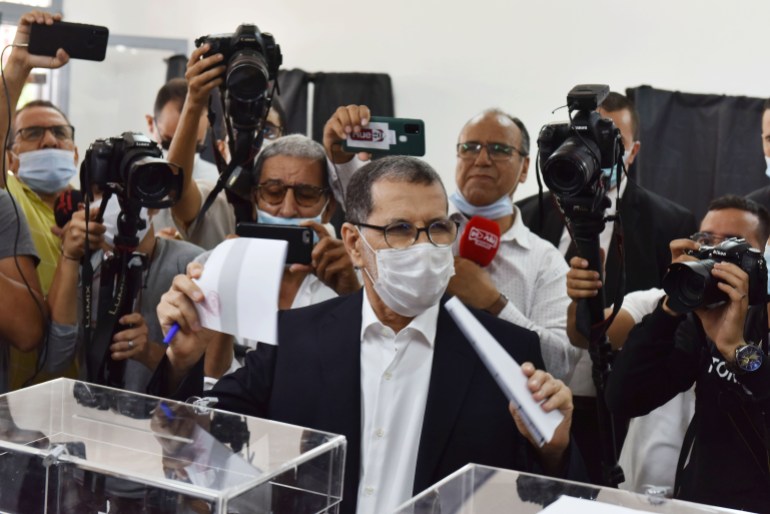The Moroccan Ministry of Interior announced on Wednesday evening that the voter turnout in the elections at the national level was 50.18%.
On Wednesday, voters in Morocco cast their votes to choose their candidates for the House of Representatives and the regional and municipal councils, in an election in which candidates from about 30 political parties are competing.
The Justice and Development, the National Rally of Independents, Al-Istiqlal, and Authenticity and Modernity parties are the most prominent contenders in this election.
The lists for the elections to the House of Representatives (the first chamber of parliament: 395 seats) include 6,815 candidates, while the lists for municipal and district council elections include 157,569 candidates.
Polling stations opened at 08:00 am and voting continues until 19:00 local time (from 07:00 to 18:00 GMT), to receive 17 million and 983 thousand and 490 voters (out of about 36 million people).
It is the first time that general elections are held in Morocco on one day.
The Ministry of Interior said in a statement that the voting process "passes under normal circumstances", according to information received from the various regions and districts of the Kingdom.
She added, "The participation rate at the national level, at twelve o'clock in the afternoon, was 12%."
National Charter
Unofficially, the winning party is expected to be known before midnight on Wednesday, as happened in the 2011 and 2016 elections.
In general, it is expected that the number of seats for major parties in the next parliament will decline due to a new pattern of calculating votes in relation to the total registered in the electoral lists, whether they participated in the polls or not. Previously, this calculation was based only on the number of voters since the first elections held in Morocco. 1960's.
Saad Eddine El Othmani, Head of Government and Secretary General of the Justice and Development Party, casts his vote in Salé (European)
The Justice and Development Party had opposed this new "electoral denominator," as it was called.
He is expected to lose, according to various estimates, between 30 and 40 seats, even if he gets the number of votes he won five years ago and gave him 125 seats, which would complicate his task in forming a government if he leads the way in the results.
Regardless of the identity of the winning party in the elections and the composition of the next government, it is assumed that all political parties adopt a "national charter for development" inspired by the "new development model" prepared by a royal committee and announced last May.
The new model aims to change the “climate characterized by a crisis of confidence in the country” due to “the slowdown in the pace of economic growth and the exacerbation of disparities,” according to the report of the committee that prepared it.
The report, which is based on official figures, indicates that "10% of the richest Moroccans concentrate a wealth equal to 11 times what belongs to the poorest 10% of the population."
The repercussions of the Covid-19 pandemic have deepened poverty and vulnerability rates, according to official data.
elections and promises
Before the pandemic, the King of Morocco, Mohammed VI, promised in a speech in 2019 on the occasion of the 20th anniversary of his rule, to “renew the development model” for “a Morocco where there is no place for blatant disparities,” noting that the achievements made at the level of infrastructure in particular “did not Unfortunately, it includes all segments of society.
After the elections, King Mohammed VI appoints a prime minister from the party that obtains the largest bloc in parliament, and the prime minister-designate is supposed to form a new government for five years.
The constitution, adopted in the context of the Arab Spring in 2011, grants broad powers to the government and parliament.
But the king retains the centrality of decision-making on strategic issues and major projects that do not necessarily change with the change of governments.
The Justice and Development Party (AKP) assumed the presidency of a coalition government in the wake of the protests of the February 20, 2011 movement, which demanded "the overthrow of corruption and tyranny."
Morocco is the only country in the region where Islamists have been in power for 10 years after the Arab Spring.
boycott obsession
The atmosphere of these elections is dominated by the obsession of the boycott, especially among the youth group, as it is taking place in exceptional circumstances imposed by the Corona pandemic that affected the conduct of electoral campaigns on the one hand, and the interests of the Moroccan citizen on the other hand.
Despite the cold election campaign, which was absent from major gatherings, the confrontation escalated in recent days between the Islamists and the National Rally of Independents.
The election campaign, which ended at midnight on Tuesday, saw accusations of using money to buy votes and attract candidates.
The AKP condemned this on several occasions, but without naming any party.
It is noteworthy that in the absence of opinion polls on voters' trends, local media estimates indicate that the competition for the leadership of the next government will focus between Justice and Development, which has an Islamic reference, and the National Rally of Independents and Contemporary Authenticity parties, who are affiliated with the liberals. The Independence Party (center-right) is also running.

